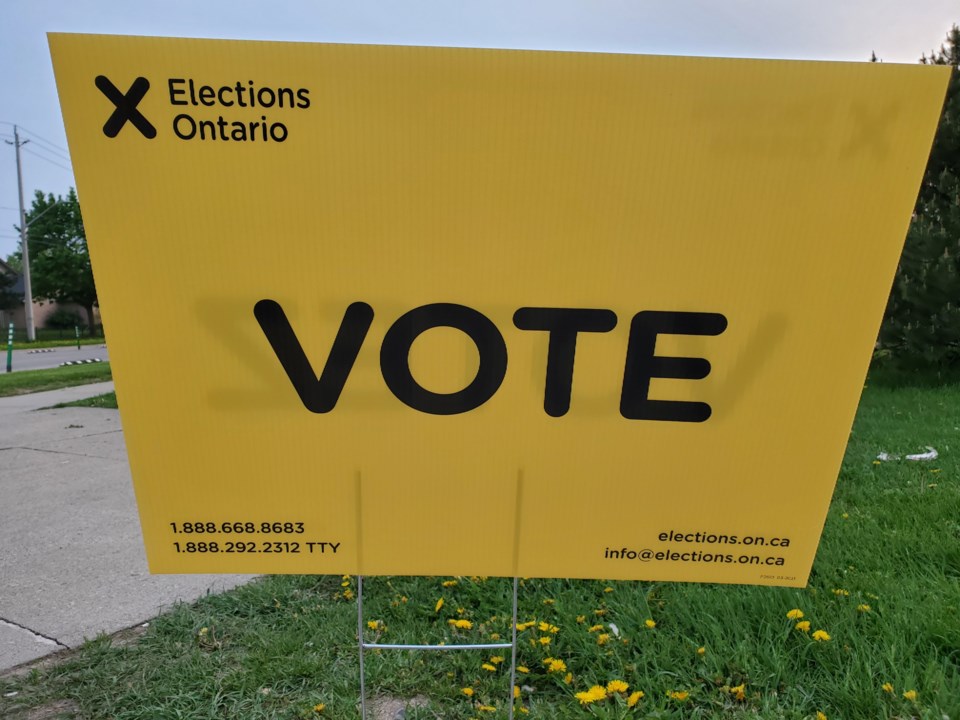Voting has now closed at most polling stations across the province.
Polls were set to close at 9 p.m. ET, but Elections Ontario says voting has been extended at 27 polling stations in 19 ridings.
Counting can't begin in those districts until their polls are closed.
A source with knowledge of the vote counting told The Canadian Press the extensions are happening for several reasons, including some polling stations opening late, and others having to move locations because of technical issues as well as power outages.
The biggest delays are seen in the northern ridings of Algoma-Manitoulin and Kiiwetinoong, which are delayed until 11 p.m., and in the Hamilton-area riding of Flamborough-Glanbrook, which will see one poll open until 10:45 p.m.
As well, Perth-Wellington in southwestern Ontario won't start counting until 10:20 p.m. because of a delay at one poll, but the other ridings will all still close before 10 p.m.
The other affected ridings are: Brantford-Brant, Cambridge, Don Valley West, Etobicoke Centre, Mississauga East-Cooksville, Mississauga-Lakeshore, Oakville, Ottawa-Vanier, Parry Sound-Muskoka, Sarnia-Lambton, Simcoe North, Thunder Bay-Atikokan, University-Rosedale, Whitby, and York Centre.
Polling conducted earlier in the campaign suggests the Progressive Conservatives led by Doug Ford are poised to form a second majority government.
There are 124 seats up for grabs in the election, with 63 needed to form a majority government. The Progressive Conservatives won 76 seats in 2018 but held 67 when the legislature was dissolved ahead of the campaign, with changes due to expulsions and resignations.
Ford largely campaigned on his party's promises to build Ontario highways and hospitals, as well as other measures he's touted as job-creators. He held limited media availabilities in the days leading up to the election.
The New Democrat and Liberal leaders both presented themselves as the only alternative to Ford's Tories and haven't outright said they will work together in the event of a Progressive Conservative minority. However, they have both said they would not support a Ford minority.
It could be the last election as NDP leader for Andrea Horwath, who made a fourth run for the premier's office after her party made gains in 2018 to form the official Opposition in provincial parliament.
Her party won 40 seats in the last election and sat at 38 at dissolution after an expulsion and a resignation.
Her party has proposed speeding up pharmacare and dental care plans for Ontarians, hiring more nurses and teachers, covering mental health and birth control costs and raising the minimum wage to $20 in 2026.
The Liberals, meanwhile, are hoping to rebuild after a devastating defeat four years ago that saw their caucus reduced to just seven seats after spending more than a decade in government.
Leader Steven Del Duca, who lost his seat in 2018, is also facing an apparently tight race in his own riding of Vaughan-Woodbridge, though he says he intends to stick around as leader regardless of the result.
The Liberal platform includes plans to make COVID-19 vaccinations compulsory for school attendance, remove provincial HST on prepared foods under $20 and boost the minimum wage to $16 per hour by next year.
The Ontario Greens have proposed free mental health coverage, reaching net zero emissions by 2045 and protecting 30 per cent of Ontario lands and water by 2030.
That party led by Mike Schreiner is hoping to expand its caucus of one seat – won by Schreiner in Guelph four years ago – and has been eyeing a potential opening in Parry Sound-Muskoka.
Elections Ontario has said more than one million people voted in advance polls last month and also has noted a sharp rise in mail-in ballots requested compared with the 2018 election.
Voting kits were mailed to 126,135 eligible voters this time around, up from 15,202 ballots last election.
This report by The Canadian Press was first publishedJune 2, 2022.
The Canadian Press



